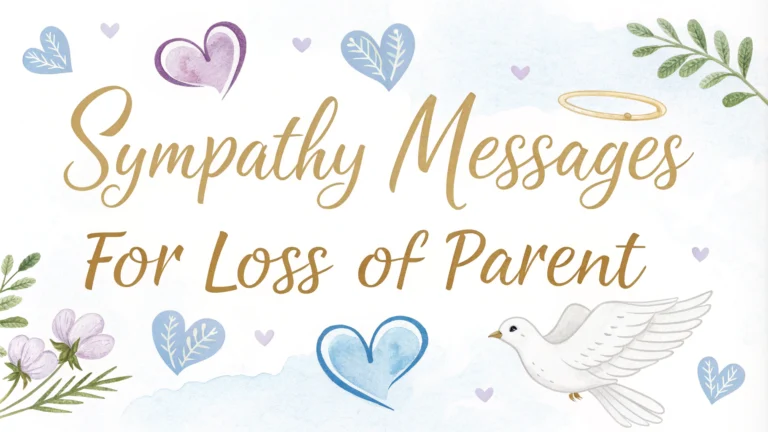Losing a parent is one of life’s most challenging experiences, and finding the right words to comfort someone during this difficult time can feel overwhelming.
Simple Messages of Support
- “I’m so sorry about your [mother/father].”
- “Your [mom/dad] was such a wonderful person.”
- “I’m here for you, whatever you need.”
- “Sending you love and strength during this time.”
What to Write in a Sympathy Card
A heartfelt message should include three elements: acknowledgment of the loss, a personal memory if you knew their parent, and an offer of specific support.
Sample Messages for Close Friends
- “I remember how your dad always made us laugh at sleepovers – he touched so many lives with his kindness.”
- “Your mom’s garden parties were legendary, and I’ll always cherish those memories.”
- “I’m dropping off dinner this Wednesday – no response needed.”
Messages for Colleagues
- “My deepest condolences on the loss of your father.”
- “Please take all the time you need – we’ve got things covered here.”
- “Would you like me to help coordinate any work responsibilities while you’re away?”
Practical Ways to Show Support
- Offer specific help with tasks like meal preparation or childcare
- Share photos or memories of their parent
- Mark your calendar to check in after a few weeks when support typically diminishes
- Consider making a donation to a cause their parent cared about
What to Avoid Saying
- “They’re in a better place”
- “Everything happens for a reason”
- “I know exactly how you feel”
- “At least they lived a long life”
Long-term Support Ideas
| Occasion | Thoughtful Gesture |
|---|---|
| First Mother’s/Father’s Day | Send a card acknowledging the difficulty of the day |
| Death Anniversary | Share a memory or photo of their parent |
| Parent’s Birthday | Offer to spend time together or send a caring message |
Remember that grief has no timeline, and your consistent support matters more than finding perfect words.
Support Resources
- Grief Support Groups: grief.com
- Online Counseling: BetterHelp
- Books on Grief: “It’s OK That You’re Not OK” by Megan Devine
When Words Aren’t Enough
Sometimes simply being present and offering a listening ear can be more meaningful than any words. Physical presence, a gentle hug (if appropriate), or sitting in comfortable silence can provide immense comfort.
Small Acts of Care
- Leave care packages at their doorstep
- Help with household tasks without being asked
- Send text messages just to check in
- Remember important dates throughout the year
Supporting Different Types of Grief
Everyone grieves differently, and their needs may change over time. Some may want to talk about their parent frequently, while others prefer distraction.
Signs They May Need Extra Support
- Withdrawal from regular activities
- Difficulty performing daily tasks
- Prolonged depression or anxiety
- Significant changes in sleeping or eating patterns
Conclusion
Supporting someone who has lost a parent requires patience, understanding, and consistency. While there’s no perfect formula for providing comfort, showing up with genuine care and practical support can make a meaningful difference in their healing journey. Remember that grief doesn’t follow a predictable timeline, and your continued presence matters long after the initial loss.
The most important thing is to remain authentic in your support while being mindful of the griever’s individual needs and preferences. Your willingness to be there, listen, and offer practical help can provide invaluable comfort during one of life’s most challenging transitions.
FAQs
1. What are appropriate words to say to someone who lost a parent?
“I’m deeply sorry for your loss,” “Your parent was such a wonderful person,” or “I’m here for you” are appropriate expressions. Keep messages sincere and heartfelt.
2. Is it okay to share memories about the deceased parent?
Yes, sharing specific, positive memories about their parent can be comforting and helps keep their memory alive. Ensure the memories are respectful and uplifting.
3. How long should I wait before reaching out to someone who lost a parent?
It’s appropriate to reach out immediately upon hearing the news. Follow-up messages weeks or months later are also appreciated as grief continues long after the funeral.
4. Should I send a sympathy card, text message, or make a phone call?
Any form of communication is appropriate. Written cards provide a lasting keepsake, while calls offer immediate personal connection. Choose based on your relationship with the bereaved.
5. What should I avoid saying to someone who lost a parent?
Avoid phrases like “They’re in a better place,” “Everything happens for a reason,” or “I know how you feel” as these can minimize their grief or seem presumptuous.
6. Is it appropriate to offer practical help in a sympathy message?
Yes, specific offers of help like “Can I bring you dinner this week?” or “Would you like me to help with household tasks?” are appreciated and practical.
7. How do I acknowledge difficult parent-child relationships in sympathy messages?
Keep messages simple and focus on the bereaved person’s feelings rather than the relationship quality. “I’m thinking of you during this difficult time” is appropriate.
8. When is it appropriate to send religious sympathy messages?
Only send religious messages if you’re certain about the recipient’s faith and beliefs. Otherwise, stick to non-religious expressions of sympathy.
9. Should sympathy messages be different for loss of mother versus father?
While the core message remains similar, you can acknowledge the unique bond with each parent. The key is personalizing the message to the specific relationship.
10. How can I support someone long-term after they’ve lost a parent?
Mark your calendar for significant dates like birthdays, death anniversaries, and holidays to reach out. Continue checking in periodically, as grief doesn’t follow a timeline.







